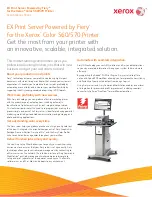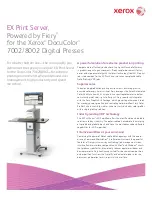
Installing a memory module
The following notes describe the types of dual inline memory modules (DIMMs) that
the server supports and other information that you must consider when you install
DIMMs (see “System-board optional-devices connectors” on page 18 for the
location of the DIMM connectors):
v
The server supports industry-standard, 1066 or 1333 MHz, PC3-10600R-999
(single-rank or dual-rank) double-data-rate 3 (DDR3), registered or unbuffered,
synchronous dynamic random-access memory (SDRAM) dual inline memory
modules (DIMMs) with error correcting code (ECC). For a list of supported
options for the server, see http://www.ibm.com/servers/eserver/serverproven/
compat/us/; then, select your country and navigate to the list of options for the
server.
v
The maximum amount of memory that the server supports is dependent on the
type of memory that you install in the server. See “Unbuffered DIMMs (UDIMMs)”
on page 170 and “Registered DIMMs (RDIMMs)” on page 171 for more
information.
v
The amount of usable memory is reduced, depending on the system
configuration. A certain amount of memory must be reserved for system
resources. To view the total amount of installed memory and the amount of
configured memory, run the Setup utility. For additional information, see “Using
the Setup utility” on page 225.
v
The maximum operating speed of the server is determined by the slowest DIMM
in the server.
v
If you install a pair of DIMMs in DIMM connectors 2 and 5, the size and speed of
the DIMMs that you install in DIMM connectors 2 and 5 must match each other.
How ever, they do not have to be the same size and speed as the DIMMs that
are installed in DIMM connectors 1 and 4.
v
You can use compatible DIMMs from various manufacturers in the same pair.
v
When you install or remove DIMMs, the server configuration information
changes. When you restart the server, the system displays a message that
indicates that the memory configuration has changed.
Attention:
Static electricity that is released to internal server components when
the server is powered-on might cause the server to stop, which could result in
the loss of data. To avoid this potential problem, always use an
electrostatic-discharge wrist strap or other grounding system when working inside
the server with the power on.
v
The specifications of a DDR3 DIMM are on a label on the DIMM, in the following
format.
ggg e
Rx
ff
-PC3-
wwwwwm
-
aa
-
bb
-
cc
where:
ggg
is the total capacity of the DIMM (for example, 1GB, 2GB, or 4GB)
e
is the number of ranks
1 = single-rank
2 = dual-rank
4 = quad-rank
ff
is the device organization (bit width)
4 = x4 organization (4 DQ lines per SDRAM)
8 = x8 organization
16 = x16 organization
wwwww
is the DIMM bandwidth, in MBps
Chapter 5. Removing and replacing server components
169
Summary of Contents for System x3200 M3
Page 1: ...System x3200 M3 Types 7327 and 7328 Problem Determination and Service Guide...
Page 2: ......
Page 3: ...System x3200 M3 Types 7327 and 7328 Problem Determination and Service Guide...
Page 20: ...xviii System x3200 M3 Types 7327 and 7328 Problem Determination and Service Guide...
Page 42: ...22 System x3200 M3 Types 7327 and 7328 Problem Determination and Service Guide...
Page 160: ...140 System x3200 M3 Types 7327 and 7328 Problem Determination and Service Guide...
Page 240: ...220 System x3200 M3 Types 7327 and 7328 Problem Determination and Service Guide...
Page 264: ...244 System x3200 M3 Types 7327 and 7328 Problem Determination and Service Guide...
Page 280: ...260 System x3200 M3 Types 7327 and 7328 Problem Determination and Service Guide...
Page 281: ......
Page 282: ...Part Number 90Y5683 Printed in USA 1P P N 90Y5683...
















































